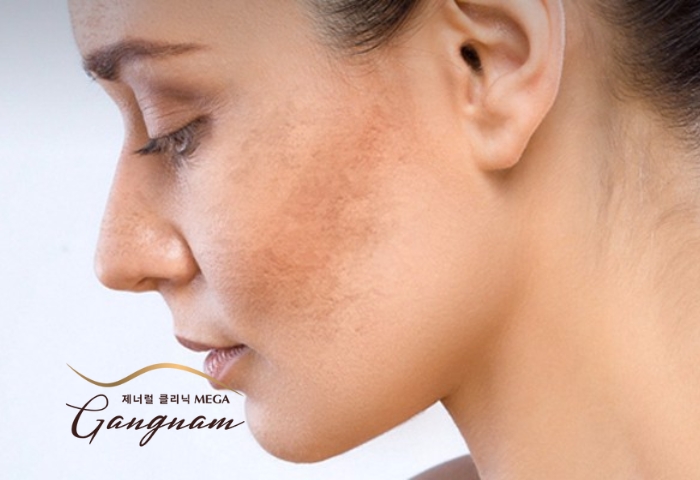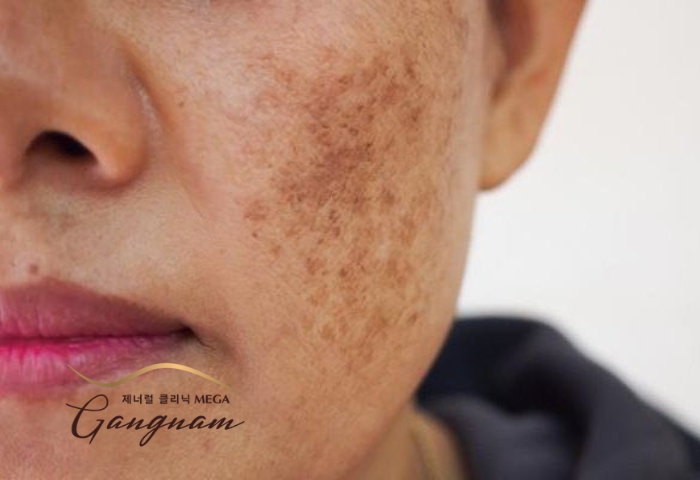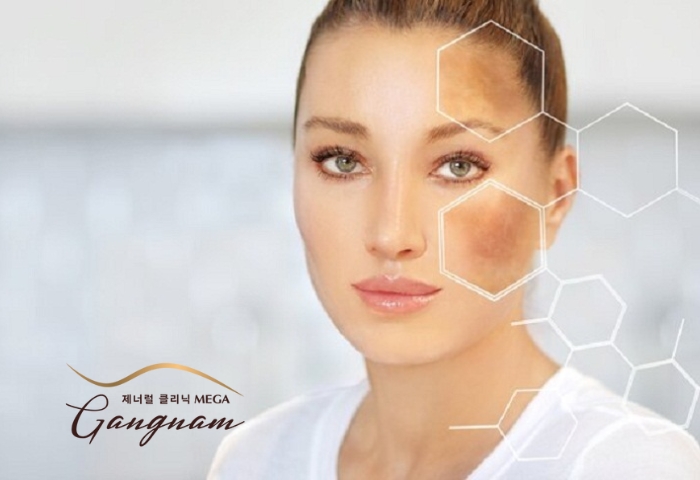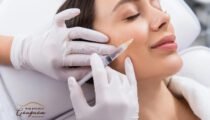What should I do if my skin has abnormal hyperpigmentation?
In fact, with the effects of the surrounding environment, age, and changes in the body, it is difficult for us to preserve the beauty of our skin forever. These factors are completely capable of turning into obstacles that cause facial skin to become hyperpigmented. This is a skin disease that is difficult to treat and takes a lot of time and patience. Therefore, as soon as you detect signs of skin deterioration, you need to take immediate treatment measures. So what to do with hyperpigmented skin? Please follow the information below to receive answers from dermatologists!

What to do when skin has hyperpigmentation?
What is the phenomenon of skin hyperpigmentation?
Hyperpigmented skin is one of the manifestations of pigmentation disorders. However, this can also be the result of many other causes such as living environment, medications and subjective factors. Hyperpigmentation occurs when melanin production is pushed up, exceeding normal levels. As a result, our skin begins to appear dark brown spots or patches. This phenomenon can occur in any area of the skin. However, hyperpigmentation in the face, neck, and hands is most common.
The degree of skin hyperpigmentation depends on the specific location and cause. If hyperpigmentation is not controlled and continues to increase, it can have negative effects on your appearance. The skin becomes dull, uneven, and lacks color, especially on the face. Therefore, learning the signs, causes and measures to control hyperpigmentation is very important.
The first signs that help recognize hyperpigmentation on the facial skin are:
- Forming areas with patches of skin that are drier than normal, skin color is a bit darker, and have a burning or itchy feeling. This condition becomes more pronounced after a short period of time.
- Unusual brown spots appear, the skin is darker, especially on the cheekbones, forehead, neck and hands. The color can change depending on many factors but is darker than other normal skin areas.
- Symptoms of melasma and freckles are symmetrical on both sides of the body, especially the face. The situation will quickly become more serious and quickly spread to other areas if there are no timely control measures.
- The skin is more susceptible to damage when subjected to even the slightest impact, when exposed to the environment or using beauty products.
- Skin with dark spots, melasma or freckles that do not disappear after using skin whitening products.
- Skin easily catches the sun, burns or becomes irritated, rash, or sore when exposed to sunlight. After a while, the most sensitive areas of the skin begin to darken.
Common forms of hyperpigmentation and specific causes
Although there are many forms of surface hyperpigmentation, the characteristics of these phenomena are quite similar. There are even many cases of abnormally hyperpigmented skin due to many factors. Instead of dividing into specific types such as melasma, freckles… We will classify based on similar characteristics and causes of formation. This makes symptom control and treatment simpler. Some of the most common groups of hyperpigmentation include:

Causes of hyperpigmentation
- Inflammatory hyperpigmentation: This is one of the most common causes of abnormal hyperpigmentation. Dermatitis often shows red or darker skin than normal and tends to increase over time. The cause of inflammatory hyperpigmentation can be irritation, acne, eczema, dark spots from acne or other medical conditions.
- Hyperpigmentation due to light: Sunlight and electronic devices emit light containing UV rays that can cause skin damage and hyperpigmentation. Common forms of photohyperpigmentation include melasma and freckles. This condition can spread quickly and become darker if there is no treatment or prevention of exposure to harmful rays.
- Hyperpigmentation due to aging: Over time, increasing age causes facial skin to age faster with symptoms such as dry skin, dullness, lack of elasticity and the appearance of wrinkles. The aging process can be one of the causes of hyperpigmentation on the skin.
- Hyperpigmentation due to hormones: Changes in hormones in the body during periods when the body changes such as puberty, pregnancy, and premenopause cause the skin to become darker. In addition, the use of drugs containing hormones or hormone inhibitors can cause hyperpigmentation.
- Genetic hyperpigmentation: If your family has members with hyperpigmentation who tend to have dark spots, there is a high possibility that you will also be genetically susceptible to hyperpigmentation. This phenomenon, if it comes from genetic factors, usually appears very early.
- Hyperpigmentation due to medical conditions: Certain medical conditions, such as liver disease, Addison’s disease or Cushing’s disease, can also lead to hyperpigmentation.
If you find that your skin has hyperpigmentation, you should find out the specific cause, understand the symptoms to seek solutions from dermatologists.
Can hyperpigmentation be completely treated?
Complete treatment of hyperpigmentation depends on the specific cause of this disease. In some cases, hyperpigmentation can be treated and symptoms significantly reduced. But there are also many reasons why treatment only stops at the ability to control the condition on the skin’s surface.

What to do about skin hyperpigmentation? Can it be completely treated?
If hyperpigmentation is the result of some external factor, for example: improper use of cosmetics, the effects of UV rays, or skin trauma, treatment will focus on how to eliminate or reduce the pigmentation. Minimize harmful agents. The methods applied (as prescribed by the doctor) have the ability to minimize the phenomenon of hyperpigmentation. After treatment, this phenomenon will improve significantly, the skin will return to normal and become more evenly colored. If hyperpigmentation is too severe, only about 60-80% can be recovered, depending on the treatment method.
However, if the cause of hyperpigmentation is due to genetic factors or natural aging, treatment will focus on controlling the condition. In other words, in cases like this, we cannot completely eliminate the manifestations of hyperpigmentation. But it is possible to minimize the signs of extreme skin damage and prevent the condition from continuing.
In short, the treatment of hyperpigmentation depends on the cause of the condition, and not all cases can be completely treated. However, proper treatment and maintaining a healthy lifestyle can help minimize the condition and prevent further hyperpigmentation.
What to do with hyperpigmented skin?
Surely many of you are wondering what to do with hyperpigmented skin. Depending on the skin condition, the level of development of pigment clusters and the body, we choose the appropriate method. If at first, the symptoms are not obvious, you can control symptoms and limit the risk of disease development by the ways we guide below. Then proceed to the step of professional treatment with drugs or intervention methods.

Methods to help control the increase in pigmentation
Avoid exposure to UV rays: Sunlight can cause hyperpigmentation and worsen skin conditions. Therefore, it is necessary to avoid exposure to sunlight and electronic devices for too long. Regardless of the weather, wear a hat, UV-protective glasses, and use high SPF sunscreen.
Use skin care products that contain depigmentation ingredients: Skin care products that contain depigmentation ingredients such as vitamin C, arbutin, niacinamide, and hydroquinone can help reduce hyperpigmentation. You should consider your skin condition and skin group to choose the most suitable product.
Treatments for hyperpigmentation
- Using oral medications: Oral medications or skin whitening supplements containing ingredients such as glutathione, vitamin C, vitamin E, and tranexamic acid are options for those with mild hyperpigmentation. However, you need to be consulted carefully before using oral medications because they can cause side effects in some cases.
- Using machines at home: Nowadays, to save time and treatment costs, many people are willing to choose to treat themselves at home with machines. These products include mini laser machines, exfoliators, ion machines, and others. However, you need to be careful when using machines at home because they can cause irritation, poor quality or improper operation that can affect the body.
- Cosmetic methods: These methods include: chemical peeling, or mechanical peeling, microdermabrasion, treatment with light technology, laser solution application, stem cell technology. These are the best methods to treat skin hyperpigmentation. Recommended by dermatologists in many cases. However, these methods can cause pain and skin irritation and should be performed by experienced professionals.
Above is our article to answer what to do with hyperpigmented skin. If you have any questions, please contact Mega Gangnam via Hotline: 093.770.6666 for advice and support!













